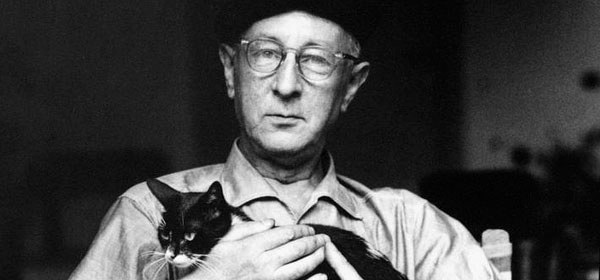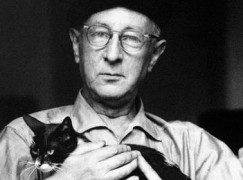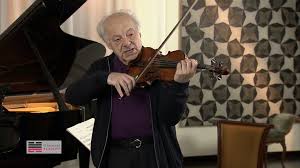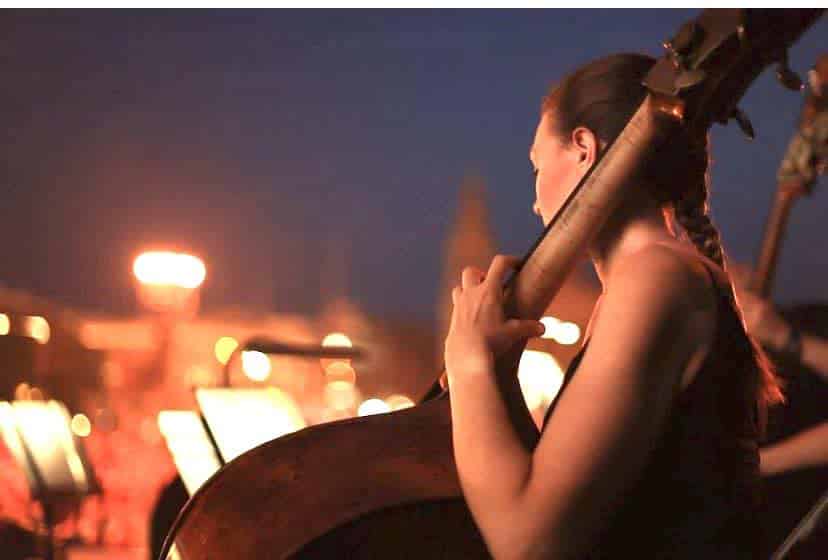Why a great composer quit Curtis
mainThe conductor José Serebrier has offered us this memoir of Bohuslav Martinu, whose music we shared earlier this week.
Martinu accepted me as his student at Curtis when I was 17, and wrote me a number of amazing letters now held at the Martinu Institute in Prague. When the Institute asked to interview me, at first I turned it down, indicating that I never got to have a lesson from Martinu, that he left Curtis before I arrived in Philadelphia, but the Institute insisted because of what Martinu had written about me. Amazing. The story of what happened is also quite amazing. Martinu lived in NY and was also teaching at Juilliard. The train New York-Philadelphia was unreliable in the mid-50’s and took at least 4 hours, so sometimes Martinu would be late for classes at Curtis. He saw that his meager pay-checks showed discounts for lateness, petty amounts, but not acceptable. He resigned and decided to leave the US.He wrote me the most beautiful letter of apology for not remaining there to teach me, and left for Switzerland [where he died].







Mr. Serebrier’s story is true. Efrem Zimbalist ,husband of the founder (Mary Louise Curtis Bok Zimbalist) was the Director at the time who made the unfortunate decision, I believe.
…and that decision was to reduce the salary payments to Martinu by the number of minutes he arrived late. How did Zimmie know this? He used to observe Martinu walking across Rittenhouse Square (coming from 30th St station) from the window of his office-studio (now known as the Zimbalist Room). How do I know this? because Vladimir (Billy) Sokoloff, told me.
The is the Slipped Disc Department of Living History. Thanks, Dean!
…and to continue this sordid tale…Zimmie also saw Martinu LEAVE a few minutes early on occasion to catch his train to NYC. Teachers were paid by the hour.
Unrelated to the above: A rather well-know voice teacher who taught at both Curtis and Juilliard came to see the Director to say: “Mr. Zimbalist, I just want you to know that Juilliard will now pay me $5 an hour more.” EZ’s reply: “Congratulations, my dear, we shall miss you.”
Before drawing conclusions, it would be helpful to know how often he was late, and by how much? The sensibility in some European countries regarding the responsibilities of professors can be quite different than in the USA. Even today, there are professors in some countries who live far away from their schools who only show up for lessons every three weeks or so. Is it perhaps possible that the liberties he took were excessive? Granted, docking pay by minutes late is a small-minded approach to the problem, but we might need more information to fully understand the situation.
It is also possible that Martinu taught faster within his own present time so that not much was lost in terms of minutes, or that the meaning of his teaching was so dense that students needed a shorter time span to endure it all.
You’ve got to be kidding. Take your Prozac.
The music posted the other day was beautiful…so is this
picture of Martinu and his cat — a good start to a cloudy Thursday. Thanks.
I’ve nowhere read that Martinu taught at Juilliard. His principal teaching gig was at Mannes, 1946-1956 minus a couple of stretches away in Europe. He taught summers at Tanglewood and also for a number of years at Princeton; he considered this last one a complete waste since the department refused to allow him to pick his students and he found no one worth teaching during his years there, or so he said subsequently somewhere.
Martinu is a Czech composer but though he didn’t make it to Paris until 1923, his composing didn’t stand up and walk until his apprenticeship to Roussel there and his suspension in the musical blender that was the French capital in those years. Because of this it is fair to call him a French composer also.
And he’s an American composer too — his home after the German occupation of France (from which he narrowly escaped with his life) for 15 years with a few interruptions, where all of his symphonies and most of his orchestral works were commissioned and composed, to name just one category, and the third country to exert a major influence: his writing then and afterwards favored the melodic, in keeping with American taste. He’d been a jazz fan from arrival in Paris onward; Gershwin, in addition, was an important influence from 1924.
He own special flavor of tonality feels very contemporary today. Even his longest and most formally-structured pieces are alive with speed and humor and surprise, plus loveliness included for free. Martinu should be the jewel in the crown of classical music in the US today.
Naturally, though, he is neglected, forgotten, and it’s hardly too much to say unknown to audiences here, kept alive mainly in the minds of good musicians though still unknown to many of them. As I can attest, having tried, it’s not easy convincing people to give a listen to any composer new to them, especially if the harmony and procedure is new. The field has been abandoned to the John-Williamses.
I have always found Martinu to be very fresh and quirky. It was my understanding that this was because he was self taught and did not follow any of the 20th century schools. He always followed his own muse.
I agree. His music has some of the French qualities of the Les SIx, but I find it much more inventive and quirky. And his tonality does seem more in tune with the post WW II era.
I would like to hear more of his work in the concert halls around the world
At least he is not neglected and forgotten everywhere. Here in Czechia he became quite cherished in last decades. His music is integral part of the repertoire of all major orchestras, musical education, Supraphon label catalogue etc. Martinů Society prepares complete critical edition of his oeuvre and helds annual festival dedicated to his works and works of his students.
But that is just to say that there are composers who are even worse off and I otherwise agree with you. Maestro Bělohlávek, one of the firm exponents of Martinů’s music, always complained about difficulties connected with performing Martinů abroad, especially US.
I heard Belohlavek conduct the 4th symphony in Hong Kong (with the Czech Philharmonic).
Yes indeed — the Czech embrace of Martinu is thrilling, exquisite; Cz performers and performances are almost always the best. The scholarly edition of the complete works is heartwarming, if glacial in its rate of publication.
Too bad that M himself, virtually a non-person in his Soviet-era homeland, didn’t live to see this emergence, though the second nonet, recently loved on this site, was a commission from the Czech nonet, which in 1959 would have had to pass official muster.
May I give a shoutout here to the Cz cellist Sasa Vectomov? This genius died young, soon after the curtain came down, and has never received the attention he warrants in the West. He recorded M’s cello output on Supraphon, here’s a taste:
https://www.youtube.com/watch?v=ImAVkJ2E0L8
Incidentally there’s a tremendous number of Supraphon Martinu recordings on YT.
@ T.E. — that’s interesting, about Bělohlávek’s complaints. He was the most effective exponent of M in recent decades.
This national barrier to musical worlds is depressing. Carl Nielsen has driven nuts by the same thing. One of the reasons M’s music faded from view in the US must have been the end of the wartime alliance with the Cz resistance, of which M was an active member, and his country’s re-appearance as part of the enemy camp, even though Martinu was by then an outcast from it.
So he taught at Princeton for 10 years but thought it a complete waste of time? I guess he didn’t think it a waste of time when banking his payments.
Yes he did it for money. He led an austere life, centered around composing, but he still had to take what came along. Should we be calling the police?
The pay for even the most famous artists, in the majority of the top institutions was absurdly low.
I recall inviting Rudolf Firkusny to perform with me at my festival in Miami (Beethoven’s Choral Fantasy), the only concert he had that season,
and him telling me the amount he was receiving from the major music school in America, per hour, for five students. Ruggiero Ricci, who often toured with me, had similar sad stories. The case of Bohuslav Martinu is that he was obviously offended by the deductions to his
meager earnings.
He was a great man, with great vision and humanity, above his greatness as composer.
I wrote to him from a small country in South America when I was 16, and Aaron Copland
send him my first scores. Martinu replied at once, accepting me as a student at Curtis,
and furthermore wrote to the US State Department to grant me a scholarship. All that is
documented at the Martinu Institute in Prague,
and they have published it in their magazine.
I recall seeing Rudolf Firkušný playing basketball in a Nike TV ad 30 years ago and thinking, “I wonder if this is one of his biggest paychecks?”
I mean, really, who really cares that Martinu quit Curtis? He found warm and welcoming homes at both the Mannes School of Music (where he taught Burt Bacharach) and Princeton University, and also Tanglewood. That’s the story, really.
Yes, but it was really Mannes. Tanglewood/Berkshire became a mess when an insurance deficit after his near-fatal fall there in 1946, required a lawsuit.
What Martinu craved was a professorship at the Conservatory in Prague. This would have allowed him to search out worthy successors and to have more than enough time for his own composing, a process which went on in his head during hours-long walks at night. Sooner or later, after days or even months, when the editing (also in his head) was complete, he would write these down, between breakfast and lunch.
And in fact he was offered such a position, just after the War, only to have it withdrawn as the vanguard of the proletariat infused itself into the Republic. Musical camps in Cz were very heavily politicized, eg Smetana vs Dvorak, and the appointment of a bitter personal enemy suddenly now aligned with Muscovy as in effect, grand high arbiter, meant return was an impossibility — likely as not a path to imprisonment and death, in the years before 1953.
Martinu never stopped seeking, yet never finding, the slacker environment he had enjoyed in Paris — a quiet beautiful low-rent city where there was no shame in hanging out in cafes, smoking, reading the papers, watching and listening to the crowd from a slight distance, and thus recharged, heading off once more into the night.
It’s true that M was welcomed into the US, his works encouraged and premiered by the great orchestras, and that that and teaching brought him enough for food and rent, but his temperament could never align with that of this place of exile, where everything happened in a noisy rush, was all about money, and which in the end couldn’t or wouldn’t manage to take time for him.
Wow. Burt Bacharach studied with Martinu at Mannes? Now that’s a great story. That should have been the lede.
When Milton Babbitt taught at Juilliard, I heard that they paid for a car service to transport Mr. Babbitt back and forth from his home in New Jersey to teach in Manhattan. Maybe someone out there can confirm (or refute) this?
The pretension is confirmed by his works.
I wouldn’t call him a great composer. His music is meh
and so is your comment
Like some comments . . .
Indeed he was not a ‘great composer’. But good music does not require a great composer. A good one is sufficient, especially given the ocean of mediocre and bad composers, or rather composeurs.
After 40 years as a professional player, I suspect that Martinu knew more about string playing than anyone.
I played and cherished his Sonata No.2 for ‘cello & piano,
where I felt my left hand fit perfectly into a well-acquainted
and well-loved glove. The second of his “Three Madrigals”
for violin & viola, as another example, is stunning…it sounds like a string quartet….
Doing my best to count up the number of Martinu works I played comes to four…….just not enough….
A four-hour train must have been a local, the cheapest possible ticket.
That was pre-Acela and Metro Liner, when it was still the old Pennsylvania Railroad, so I’m not surprised by a 4 hour trip. I took a commuter train into Philadelphia for several months in 1972. This was about 4-5 years after the Pennsy had been merged out of existence but the cars I rode on still had not been repainted, had no air conditioning and often had broken windows.
“The story of what happened is also quite amazing. Martinu lived in NY and was also teaching at Juilliard. The train New York-Philadelphia was unreliable in the mid-50’s and took at least 4 hours, so sometimes Martinu would be late for classes at Curtis.”
Sorry, in 1954 the train would have been the main way to make this trip and the time would have been about 1:30 minutes.
You are elevating gossip to the level of history and this is clearly not right factually. It sugests the composer was late for his own reasons. That would also be consistent with his termination.
Even now the rund trip Manhattan- to Phil using the most affordable local train, with an often missed connection in Trenton, can easily be a four hour ROUND trip.
Interesting that Wikipedia does not indicate he ever taught at Curtis. It indicates he taught at Mannes (not Juilliard), Princeton, and the Berkshire Music School (Tanglewood).
https://en.wikipedia.org/wiki/Bohuslav_Martin%C5%AF
“The story of what happened is also quite amazing. Martinu lived in NY and was also teaching at Juilliard. The train New York-Philadelphia was unreliable in the mid-50’s and took at least 4 hours, so sometimes Martinu would be late for classes at Curtis.”
Difficult to believe:
1) the train was the main mode of transportation in the 1950’s and would have been very reliable because everyone needed to take it;
2) I find it hard to believe that the music director did not ascertain why the composer was so late and suspect he did and it had nothing to do with the train;
3) the train trip even in 1954 (when the track was at its height, really) would have taken less than 1 hour and 30 minutes, certainly not 4 hours.
4) Wikipedia indicates the composer never taught at Curtis; he taught at Mannes (NOT at Juilliard) and at Princeton and at Tanglewood.
Just read Mr. Robert Fitzpatrick’s comments at the start of this sequence, confirming my story with even more details. He was the Dean at Curtis for several decades.
The train ride between NYC and Philadelphia did indeed take 4 hours or more in those days. I know, because I took it many times. And the arrival time
was often unreliable.
To imply that Martinu didn’t teach at Curtis makes
no sense.